Jun 18, 2025
Medicine, people, AI: patient-centered innovations in healthcare, research and teaching
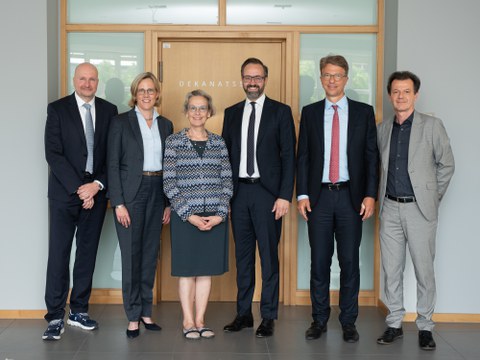
Martin Peuker, Prof. Esther Troost, Prof. Ursula Staudinger, Sebastian Gemkow, Prof. Uwe Platzbecker und Janko Haft (v.l.n.r.)
What can a medicine of the future look like that focuses on the individuality of patients with the help of digital applications? Dresden University Medicine is tackling the diverse answers to this question. The new management trio, consisting of Medical Director Prof. Uwe Platzbecker, Dean of the Faculty of Medicine at TU Dresden Prof. Esther Troost and Commercial Director Janko Haft, have now presented their ideas and innovative concepts for the Dresden Medical Campus in Johannstadt. The focus is on modern digital technologies and individual patient-centered care. Representatives from politics, healthcare, health insurance companies and providers in the region, competitors and partners from various networks as well as employees of Dresden University Medicine came together at the inaugural event on 17 June 2025 to exchange ideas.
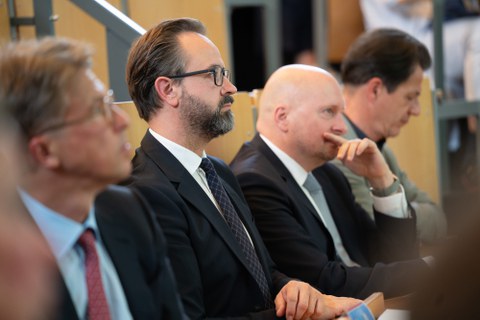
Sebastian Gemkow
Sebastian Gemkow, Saxon State Minister for Science, praised the work done so far: "In recent years, Saxon university medicine has developed into a European center and a top German location for patient care, research and teaching. This has to do with clever strategic decisions and investments, but also with the many excellent researchers who are networked here at the location worldwide. Medical progress is significantly driven by centers such as Dresden University Medicine in a wide variety of areas. This is why we will need the support of the university hospitals as a nationwide network in the future in order to make cutting-edge medicine available to everyone who needs it."
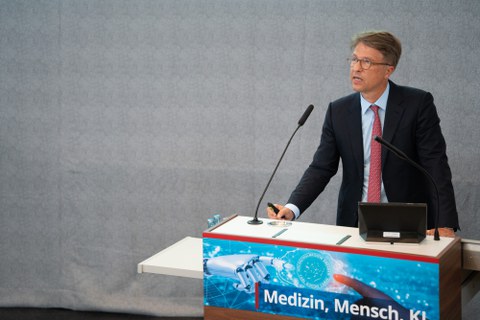
Prof. Uwe Platzbecker
"Dresden University Medicine is a microcosm of a large number of strong partners and thus a guarantor of medical progress and innovation. This must be consolidated and further expanded. Excellence on the outside is only possible through excellence on the inside. Our employees are our greatest asset. Almost 9,000 people work for and in Dresden University Medicine. We combine appreciation for our employees with concrete goals and promote participation in our decisions," said Prof. Uwe Platzbecker. "We have many committed people from patient care, teaching and research at our side and are already demonstrating how we think and live the medicine of tomorrow in a variety of innovative projects. Our Vision 2030+ stands for adherence to the guiding principles of humanity, research, innovation and sustainability. We are focusing on personalized medicine, strong alliances and even greater digitalization."
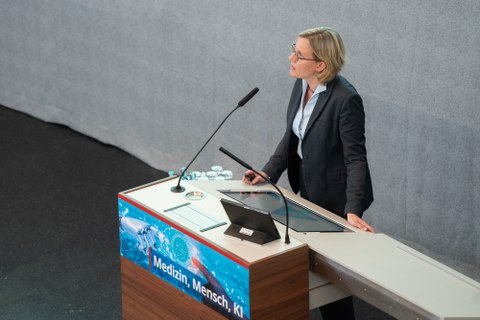
Prof. Esther Troost
"Research and teaching play a key role in modern medicine, above all because diagnostics and treatment are becoming increasingly individualized and patients expect personalized treatment tailored to their individual needs. The fact that we already offer this in many areas shows the excellence of Dresden's university medicine," said Prof. Esther Troost. "Our success is also based on the offers for young researchers and doctors. They can opt for new, innovative career paths and structured promotion of early-career researchers. The focus here is on the translation of research into patient care. Artificial intelligence vs. humanity, big data vs. intuition. Who is liable when AI influences medical decisions? Who decides? How and at what point do we involve patients? We have to ask ourselves these questions. Our wish is for a new building for translational technology. This will enable us to anchor this aspect even more firmly on the campus of Dresden University Medicine."
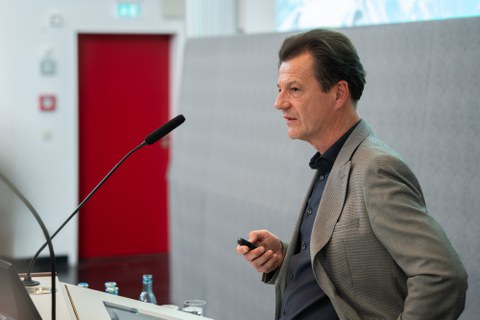
Janko Haft
"Of course, this also requires long-term sustainable funding. The hospital landscape in Germany is facing enormous challenges. The cost-revenue gap is widening more and more. This also affects us at Dresden University Hospital. Nevertheless, we are optimistic about the future. We have committed employees, modern equipment, well-equipped clinics and therefore offer very good conditions for patients," said Janko Haft. "In order to be able to continue to offer this in the future, we need to push ahead with digitalization, campaign for a real reduction in bureaucracy, focus on new care and remuneration models and conserve and make sensible use of existing resources."
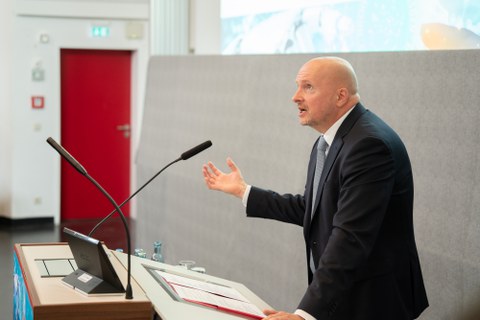
Martin Peuker
Martin Peuker, Chief Digitalization Officer at the Medical University of Lausitz - Carl Thiem (MUL - CT), gives reason for optimism. In his keynote speech, he emphasized the opportunities of digitalization, but also addressed the challenges. "Digitalization will not solve all the problems in healthcare. However, it gives us the opportunity to rethink care, intelligently network processes and redistribute responsibility. We need to see digitalization as a tool for progress and collaborative work as well as for humanity. If we want to exploit this potential, we need to work together, pool knowledge and create educational alliances - across borders," he explained.
Innovations from Dresden's university medicine
Specific use cases presented at the inaugural event provide an insight into the future topics of university medicine in Dresden.
The Else Kröner Fresenius Center for Digital Health is pursuing a wide range of research projects relating to the use of AI and other digital tools in medicine, therapy and diagnostics. As one of the first research locations in this field in Germany, the EKFZ has been attracting renowned scientists to Dresden since 2019, who are now researching a wide range of use cases.
Artificial intelligence is already being used in VTG surgery - a Chair for Minimally Invasive and Robotic Surgery has also been established here. Research is also being carried out into the causes of bone diseases - Saxony could soon be the oldest federal state in Germany.
The needs of elderly and old people require special attention - in research and patient care. Telemedicine also plays a role here. It is already being used successfully to provide stroke patients with the best possible care, even in rural areas.
Contact:
University Hospital Carl Gustav Carus Dresden
Press Office
Annechristin Bonß
+49 351 458 4162
Press
